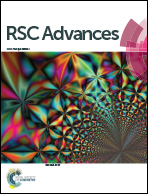Effect of reduction temperature on the structure and hydrodesulfurization performance of Na doped Ni2P/MCM-41 catalysts
Abstract
The removal of sulfur compounds from petroleum is increasingly important because of the environmental pollution caused by sulfur compounds. In this work, Na doped Ni2P/MCM-41 catalysts were successfully prepared, and their hydrodesulfurization (HDS) performances were assessed using dibenzothiophene (DBT) as a model molecule. Moreover, the effects of reduction temperature (450–600 °C) on the structure and HDS performance of the Ni2P/Na-MCM-41 catalysts were studied. Results showed that: (a) the reduction temperature of the catalyst could be as low as 450 °C due to Na doping, which is about 200 °C lower than that of the conventional temperature-programmed reduction method (650–1000 °C); (b) increasing the reduction temperature lead to an increase in the diameter of Ni2P particles, which was demonstrated by size distribution analysis; (c) the HDS performance of the Ni2P/Na-M41-T catalysts increases with reduction temperature and 99.2% DBT conversion was observed for Ni2P/Na-M41-600, whereas the hydrogenation route of the catalysts decreased with increasing the reduction temperature, which indicates the lower reduction temperature favored the direct desulfurization pathway (DDS).



 Please wait while we load your content...
Please wait while we load your content...